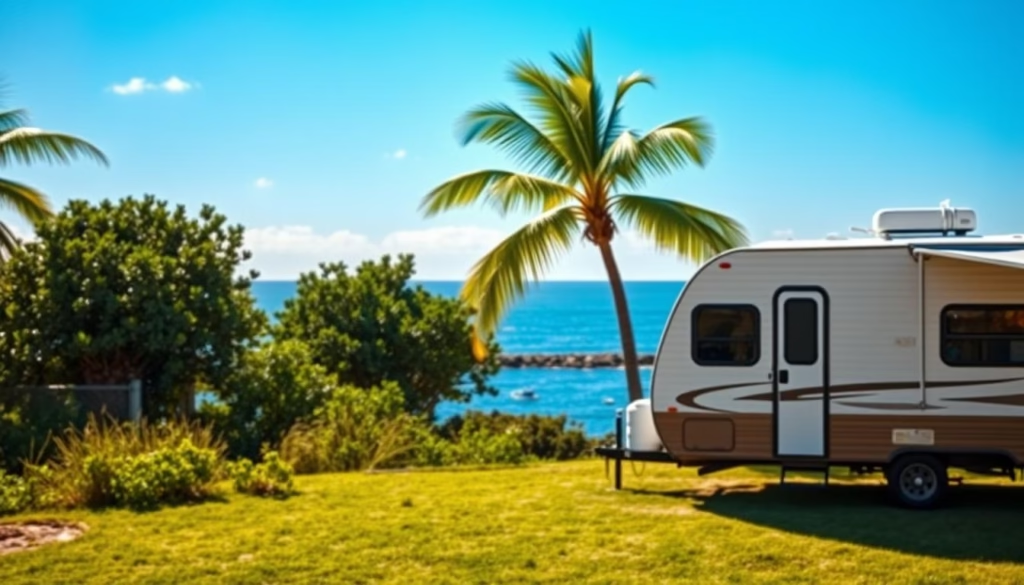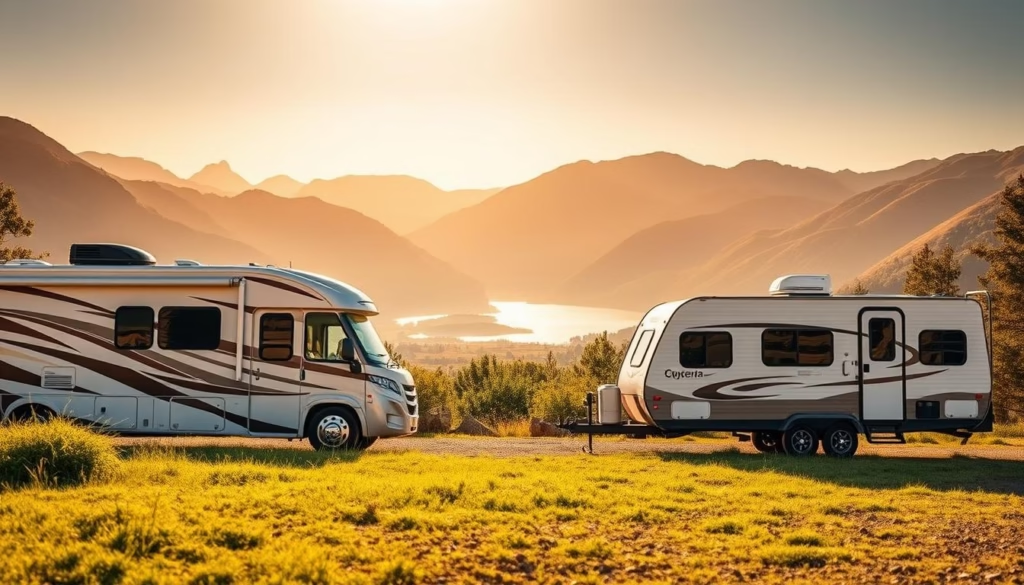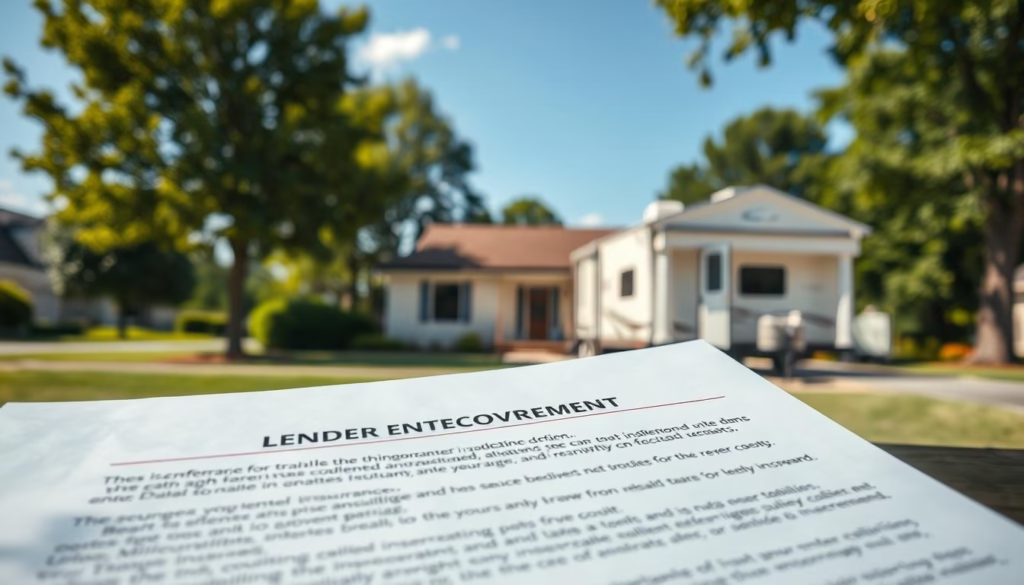Could one overlooked policy gap turn a fun trip into a costly claim?
Understanding coverage for your trailer and tow vehicle matters. In this state, motorhome drivers must carry Personal Injury Protection (PIP) of $10,000 and Property Damage (PD) of $10,000. Because most trailers are towed, the tow vehicle’s policy often governs legal minimums.
That said, a standalone policy can protect your rig from physical damage, campsite incidents, and theft of personal items. Optional add-ons include comprehensive, collision, roadside assistance, vacation liability, and total loss replacement.
Costs vary by vehicle type, zip code, driving record, and claims history. Average annual premiums recently reported show higher rates for motorhomes than for towed units. Getting quotes is fast online or in an app, and many companies offer flexible payment and discount options.
Key Takeaways
- Understanding Florida Requirements for RVs and Trailers in the present day
- Coverage options for travel trailers in Florida
- Costs, discounts, and ways to save on travel trailer insurance Florida
- Motorhome vs. travel trailer: insurance differences that matter
- Recreational use vs. full-time living: choosing the right policy
- Lender and state considerations that affect your policy
- How to get a travel trailer insurance quote in Florida
- Conclusion
- FAQ
- The tow vehicle’s policy covers state-required PIP and PD for towed rigs.
- Standalone coverage fills gaps for physical damage and campsite incidents.
- Common add-ons: comprehensive, collision, personal effects, and roadside help.
- Premiums depend on RV type, ZIP code, driving record, and claims history.
- Financed units often require comprehensive and collision by lenders.
- Quotes are available online, in apps, or by phone; compare companies and discounts.
Understanding Florida Requirements for RVs and Trailers in the present day
Knowing which coverages are required and which are optional helps avoid gaps after an accident.
In this state a motorhome is treated as a motor vehicle, so basic auto rules apply. You must carry Personal Injury Protection (PIP) of $10,000 for medical costs no matter who is at fault. The law also requires Property Damage Liability of $10,000 for damage you cause to others’ property.
Optional coverages and towed units
Bodily Injury (BI) liability and Uninsured/Underinsured Motorist (UM/UIM) BI are optional here. Typical example limits are $10,000 per person / $20,000 per accident. Note: electing UM/UIM usually means you must carry BI as well.
Separate coverage is not required for trailers because they are towed; the tow vehicle’s auto policy must meet the state’s minimums. That policy will handle third-party liability in a crash but may not pay for physical damage to the towed unit.
- Lenders often require comprehensive and collision when a unit is financed.
- RV class (A, B, C) matters because driven units follow auto rules while towed units do not.
Consider higher liability limits and tailored coverages to protect property and reduce case risk after an accident. Every driver’s needs differ, so match your insurance policy to vehicle type and usage.
Coverage options for travel trailers in Florida
Selecting the right mix of coverages helps limit out‑of‑pocket costs after theft, storm damage, or a campsite accident.
Liability and vacation liability. Liability helps pay for injuries or property damage you cause while towing or parked. Vacation liability can cover guests hurt near your campsite or damage that happens while you’re on vacation. Review your liability coverage limits to avoid gaps.

Comprehensive: non‑collision perils
Comprehensive covers theft, vandalism, fire, weather events, and animal strikes. This is crucial for owners who store units outdoors or seasonally. It often pays for repair or replacement minus your deductible.
Collision: impact protection
Collision pays for hits with vehicles, trees, fences, guardrails, or other objects. It applies whether the unit is moving or struck while parked, subject to your deductible and limits.
Optional add‑ons that matter
- Total loss replacement — may replace newer units at full value (often for models under five years).
- Personal effects replacement — covers electronics, camping gear, and other belongings.
- Emergency expense — helps with hotels or transport when a loss leaves you stranded far from home.
- Roadside assistance — towing, flat tire help, and dead‑battery service for peace of mind on longer trips.
- Pet injury — usually up to $1,000 for vet bills with no deductible.
- Pest Damage Protection and Roof Protection Plus — specialty options that cover animal or roof wear‑and‑tear gaps.
“Choose limits and deductibles that match your unit’s value, how often you use it, and the class of the vehicle you tow.”
Compare policies and add the right options to reduce your risk of large repair bills or total loss. For quick online quotes and plan comparisons, check a reputable provider like Geico RV insurance.
Costs, discounts, and ways to save on travel trailer insurance Florida
Knowing typical premiums and common discounts helps you cut costs without sacrificing needed coverage.
Average premium context: Recent 12‑month averages show motorhomes near $1,386 and towed units around $841, with some policies starting as low as $125 per year. These figures are a starting point; your actual premium will vary.
Pricing factors that move your rate
Carriers set cost based on RV type and model, repair and replacement estimates, prior claims, and your driving record. ZIP code matters because local loss rates and theft incidents differ by area.
Selecting higher limits improves financial protection but raises premium. Choosing a higher deductible lowers cost but increases what you pay after a claim.
Common discounts and stacking
- Multi-policy or multi-product bundling
- Responsible/good driver and defensive driver discounts
- Paid-in-full, original owner, anti-theft, and anti-lock brake credits
- Military, homeowner, and multi-vehicle savings
| Factor | Effect on Cost | How to Reduce |
|---|---|---|
| Vehicle model/age | Newer/larger = higher premium | Consider total loss replacement limits carefully |
| Garage ZIP code | High-theft or storm zones increase rates | Use secure storage to qualify for discounts |
| Driver & claims history | Accidents raise premiums | Maintain clean record; bundle policies |
| Coverage choices | More coverage = higher cost | Balance limits and deductibles for value |
Shopping tip: Compare quotes from multiple companies and document safety features and storage. Some carriers and clubs offer seasonal or storage-rated options that reduce premiums when a unit is idle.
“Review rates annually and after any major change—moving, buying a new unit, or filing a claim—to keep costs aligned with risk.”
Motorhome vs. travel trailer: insurance differences that matter
How you operate the unit affects who pays after a crash and what risks remain at the campsite.
How you operate your rig — behind the wheel or behind a hitch — drives different coverage needs and costs.
Driven vs. towed: how coverage applies to the vehicle and liability
Motorhome policies work like auto coverage. They include PIP, property damage, and liability for motorhomes and motorhomes’ occupants while on the road.
A travel trailer generally inherits on‑the‑road liability from the tow vehicle. That tow policy may not pay for the trailer’s own collision or for items inside it.
Campsite considerations: when vacation liability fills the gap
At the campsite, your tow vehicle’s liability may not cover guest injuries or property damage near your setup.
Vacation liability can fill that gap. It helps cover third‑party injuries and campground incidents when you are on holiday.
| Item | Motorhome | Travel Trailer |
|---|---|---|
| On‑road liability | Standalone motor vehicle policy | Usually covered by tow vehicle policy |
| Physical damage | Included in motorhome policy options | Needs separate trailer coverage |
| Personal effects | Bundled options available | Separate personal effects coverage advised |
| Campsite liability | Often included or addable | Add vacation liability to cover gaps |

“Review policies to confirm who is liable on the road and what protection covers campsite incidents.”
Recreational use vs. full-time living: choosing the right policy
Using an RV as a primary residence shifts insurance priorities toward home-style protections.
Recreational use covers part-time stays and short trips. Full-time living treats the unit like a home. That difference changes your coverage needs.
Full-timer upgrades: personal liability, medical payments, loss assessment
Personal liability on a full-time plan responds to claims if someone is hurt or if you damage another’s property while the RV is your primary home.
Medical payments help pay bills for guest injuries in or near your unit, often regardless of fault. This provides quick medical relief and reduces out-of-pocket expense.
- Loss assessment — can cover up to about $5,000 for charges from a park or association after shared losses.
- Personal property limits and additional living expense provisions replace or help house you after a covered loss.
Customize a policy to match daily living needs. Document residency, mailing address, and park rules with an agent to get the correct insurance policy form.
“The right coverage mix provides daily-living protection and supports peace of mind for those making an RV their home.”
Lender and state considerations that affect your policy
A lender’s requirements can force you to carry broader protections than state law requires.
Financing requirements: If you finance a motorhome or trailer, the lienholder will usually require both comprehensive and collision until the loan is paid. These protections guard the lender’s interest if the unit suffers theft, fire, weather damage, or an impact with another vehicle or object.

Why both comprehensive and collision matter
Comprehensive handles non‑collision perils like theft, vandalism, fire, animal hits, and storms.
Collision pays for impact damage from other vehicles or fixed objects. Together they reduce out‑of‑pocket loss after a serious incident.
What your auto policy may and may not cover when towing
Your auto policy often extends third‑party liability while towing. That helps pay for injury and property damage you cause to others on the road.
It usually will not cover physical damage to the trailer itself or personal effects inside. Verify your declarations page to confirm which vehicle and accessories a given policy lists.
- Check declarations: Confirm who and what each policy names — tow vehicle, motorhome, and any attached accessories.
- Watch for gaps: A serious accident can trigger property damage and injury claims that exceed basic limits.
- Park rules: Some parks or associations require additional limits or liability add‑ons; read those requirements carefully.
- Review annually: Update limits and deductibles if your loan balance, unit value, or usage changes.
“Maintaining proper coverage helps you meet state rules, satisfy lender requirements, and avoid costly gaps after an accident.”
For guidance on financing and required protections, see this expert financing checklist.
How to get a travel trailer insurance quote in Florida
Start your quote process by assembling key facts about the unit and how you use it.
What to gather before you ask for a quote:
- Model year, make, and series name.
- Exact model number or VIN when available.
- Average usage days per year — honest estimates help pricing.
- Lienholder contact (name, address, email/fax) if financed.
Why usage days matter
Carriers price based on exposure. More days on the road or at campsites usually raises risk and the premium.
Give your best estimate so the company can tailor coverages and limits to actual use.
How to get your quote
You can request a quote online, in an app, or by phone with a licensed specialist. Progressive offers quick online quotes and agents at 1‑866‑749‑7436. GEICO provides phone quotes at (877) 434‑2678 and app‑based policy management.
Bundling, payment, and add-on options
Bundling with auto, homeowners, renters, boat, or motorcycle often unlocks multi‑policy discounts and simpler billing. Ask about paid‑in‑full credits and flexible payment plans.
Also request roadside and other options upfront so needed services are included before your next road trip.
“Get at least two quotes from different insurance companies to compare coverage, service, and price.”
Conclusion
A final review helps you lock in the right mix of coverages so a loss doesn’t become a financial shock. Check limits, deductibles, and listed vehicles before you buy.
State rules treat motorhomes differently and do not force a separate travel trailer policy. Confirm how motorhome insurance and your tow vehicle interact, and match choices to your RV class and how you use rvs across states.
Prioritize liability, comprehensive, and collision, plus vacation liability and personal effects to reduce exposure to theft or damage. These coverage pieces work together to protect property and limit loss after an incident.
Compare at least two quotes and check each insurance company’s service record. If you finance the unit, follow lender requirements and consider higher limits for serious claims.
Get a quick quote today and head into your next travel with greater peace of mind.
FAQ
What coverage does a Florida motorhome need by law?
Florida requires personal injury protection (PIP) of ,000 and property damage liability of ,000 for licensed motor vehicles, including many motorhomes. Bodily injury and uninsured/underinsured motorist coverages are optional but strongly recommended to protect against serious claims beyond PIP limits.
Is separate coverage required for a towed travel trailer, or does my tow vehicle policy cover it?
Your tow vehicle’s policy may offer limited coverage, but many auto policies exclude extensive protection for towed units. Carry a dedicated policy for the towed unit to cover liability at the campsite, physical damage, theft, and contents loss that the auto policy often won’t.
What types of physical damage coverage should I consider?
Key options include collision (damage from impacts), comprehensive (theft, vandalism, fire, weather, animal strikes), and total loss replacement for newer models. Choose limits and deductibles that match the unit’s value and your tolerance for out-of-pocket costs.
How does vacation liability differ from standard liability?
Vacation liability protects you for incidents that occur while parked or camping, such as a guest’s injury at your campsite or accidental damage to campground property. Standard liability covers on-road incidents involving other vehicles or property.
What optional add-ons are worth considering?
Useful endorsements include roadside assistance, personal effects coverage for belongings, emergency expense reimbursement for unexpected housing or travel, pet injury coverage, pest and roof protection, and rental reimbursement when your unit is being repaired.
What drives the cost of coverage in Florida?
Premiums vary by unit type and model, claims history, driving record of the owner, ZIP code, chosen limits and deductibles, and whether the unit is used seasonally or full-time. Theft and weather risk in certain areas can raise rates.
What discounts can lower my premium?
Common discounts include multi-policy bundling, multi-vehicle, good-driver, paid-in-full, military, original-owner, and anti-theft or safety equipment discounts. Ask insurers like Progressive, GEICO, or State Farm about specific savings.
How does insuring a motorhome differ from insuring a towed unit?
A motorhome is a driven vehicle and typically requires auto-style coverages (liability, PIP, collision). A towed unit needs property-style coverages tailored to stationary risks and contents. Liability exposure also shifts depending on who’s driving and where the loss occurs.
If I live full-time in my unit, do I need a different policy?
Yes. Full-time residents should upgrade coverage to include higher personal liability, medical payments, loss assessment, and increased personal property limits. Insurers may also offer endorsements for mail forwarding and agreed-value settlements.
Will my lender require specific coverages?
Most lenders require comprehensive and collision with an agreed or replacement-cost value to protect their interest. They often name the lienholder on the policy and may require proof of coverage before funding.
Can my auto policy cover towing-related incidents?
Some auto policies extend liability to cover incidents while towing, but they rarely cover physical damage to the towed unit or campsite liability. Review exclusions and ask for a binder that clarifies towing exposure.
What information should I gather before requesting a quote?
Prepare the year, make, model, VIN or series number, primary use (seasonal vs. full-time), expected days of use, estimated value, and lienholder details. Also have driver history and current insurance info ready to get accurate rates.
How can I get a quick and reliable quote?
Get quotes online through insurer websites or apps, call carriers directly, or work with an independent agent who compares multiple companies. Compare coverages, limits, deductibles, and exclusions—not just price.
Are there payment or bundling options to make premiums easier to manage?
Yes. Many carriers offer monthly installments, paid-in-full discounts, and bundling savings when you combine home, auto, and unit coverage. Ask about automatic payments and multi-policy credits to reduce total cost.